As part of my role at Thorne Harbour Health working on the SAMESH Health Promotion Program I wrote these newsfeed articles, among others, for LGBTIQ+ communities and people living with HIV in South Australia.
25 January 2024
SMART Tools to help our diverse communities navigate addiction
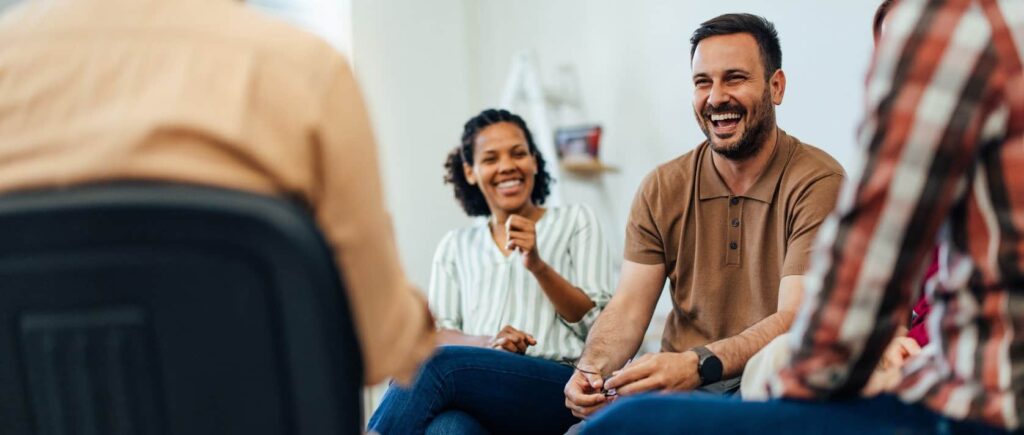
Addiction can present unique challenges for our diverse communities to navigate. We spoke with Scott Walker, an alcohol and other drug peer support worker at Thorne Harbour Health in Adelaide, about tools and services that folk can utilise in navigating stigma relating to addiction.
It can be difficult to draw the line between substance use and misuse, and for some that will mean coming to terms with an addiction.
“It’s often a significant internal struggle trying to cope with those ‘demons,’ for lack of a better word. Many people worry on the sidelines, offering their feelings or thoughts about what they consider the correct way you should walk the path,” said Scott.
“Identifying that the addiction is problematic can really only come from one person – and that is the individual.”
Realising you have an addiction is hard, but trying to change that problematic behaviour for the better can be even harder.
“It’s common to not know where to go, who to talk with, or what to talk about, [especially] alongside experiences of stigmatisation, discrimination – externally and internally,” he said.
“All of these factors can contribute to why navigating recovery can be really difficult because it’s quite a tough journey.”
Thorne Harbour Health’s SMART Group Sessions are held every week in Adelaide for people who want to manage addiction. The sessions can assist them in changing their relationship with alcohol, drugs, sex, or a range of other addictions. SMART stands for Self-Management And Recovery Training.
Scott and other facilitators focus on creating a destigmatising and safe space for group attendees.
“People managing addiction – or even contemplating that they might have a problem with addiction – can come and learn from people of similar, or maybe even some differing experiences,” said Scott.
“A key component of the program is recognising people’s own experience and their expertise in navigating their journey so far – to have a space to form mutual connections, hear about what works for other people, and hopefully pick up a new tool or strategy to support individuals with their self-defined goals.”
People can be addicted to a range of things including, but not limited to:
- Sex and hypersexuality
- Pornography and masturbation
- Gambling
- Alcohol
- Smoking or vaping
- GHB
- Methamphetamine
The heightened stigma experienced by people addicted to methamphetamine can make recovery even harder. Scott spoke frankly about his own experience.
“I’m very fortunate to be able to use my journey of recovery from methamphetamine to connect with people and reduce some of those barriers for people accessing therapeutic support, which is one of the most beneficial spaces to work through in navigating recovery.”
When people are focused on fighting addiction, it can be a struggle to maintain meaningful interpersonal relationships, regulate their emotions effectively, or even do basic things like showering or eating.
Self-compassion and unconditional acceptance are some of the most beneficial tools for folk feeling the impacts of their addiction, but they’re not the only ones.
The A.B.C. model is one of Scott’s favourite tools that people can utilise in managing urges. For example, if you were trying to quit smoking, you might ask yourself:
Activating event: What triggered those feelings that made you want a cigarette?
Beliefs: Why do you think you want a cigarette?
Consequences: Could this lead me to buy a pack of cigarettes next week?
“Lots of different tools that are adaptable through the SMART model to support people in managing that temptation,” Scott said.
If you’re struggling specifically with drug or alcohol addiction, learn more about Thorne Harbour Health’s LGBTIQA+ Specialist Alcohol and Other Drug Service in Adelaide.
20 December 2023
Navigating Mental Health and Substance Use During the Holiday Season
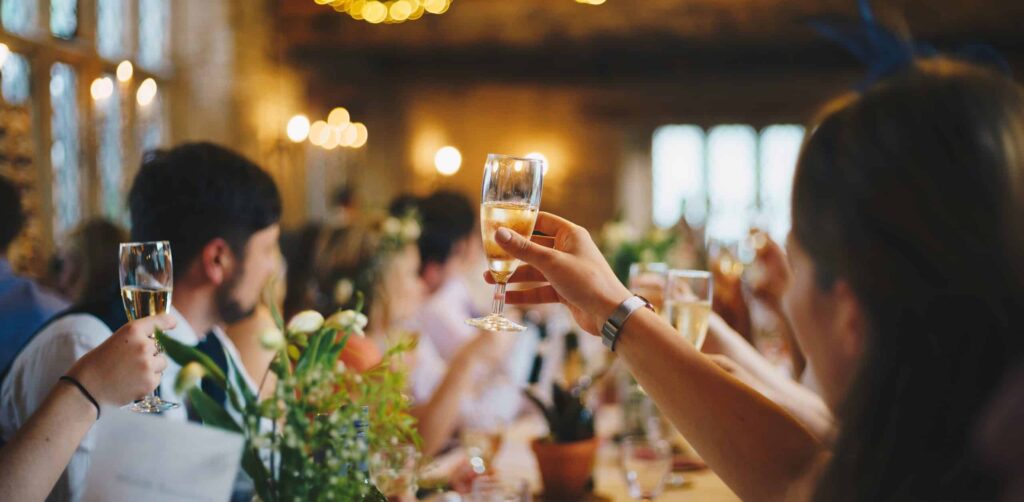
The holiday season, often seen as a time for joy and connection, can bring unique challenges for our LGBTIQ+ communities.
We spoke with Joe Ball from Switchboard Victoria and Venetia Brissenden from Thorne Harbour Health about how people can manage their mental health and substance use during the holidays, especially when facing potentially confrontational family situations.
Returning to one’s family of origin can be a poignant experience, filled with the anticipation of reuniting with family. For LGBTIQ+ folk facing non-acceptance though, it can be isolating and stressful.
“The funny thing about this time of year is we do things that we do only once a year, and so we often pick up where we left off,” Joe says.
“If that place we left off was discrimination, rejection, maybe even violence, then you’re returning to that place.”
The pressure is particularly high for trans and gender-diverse people who may face questions about their appearance during this time of heightened expectations.
Staying connected to chosen family becomes crucial during the holidays. Joe said it’s important to set boundaries and give yourself space when you need.
Joe says asking yourself questions like these could help you plan ahead:
- What can I do if family members aren’t affirming of my identity?
- Am I going to be able to just drive away and do my own thing?
- Do I have friends in the local area I’m going to be able to catch up with?
- If I don’t have a car, what are the public transport options?
He encourages people to remember you can always walk away from uncomfortable and dangerous situations.
“Give yourself permission to do things, and then once you’re outside, you can take some deep breaths and take stock and just be like, ‘okay, how am I doing now that I’m not in that fiery moment?’”
For those in need of immediate support, Qlife is a national service that offers phone and webchat support every day.
Venetia Brissenden brings additional insight into managing alcohol and other drug use during the holidays. She outlines warning signs that substance use may be escalating, such as changes in consumption levels, increased spending, and the development of withdrawal symptoms.
“You might have developed some tolerance for a drug. You might have become really reliant on what the drug does for you. There’s some stuff there that maybe needs to be worked through and, yeah, it might be time to talk to somebody about that,” says Venetia.
In terms of self-management, Venetia recommends the use of a drug and/or alcohol diary. It can help track substance use patterns, identifying triggers, stressors, and potential interventions. Gathering information like this can allow for informed decision-making and could empower people to take control of their usage.
“If you notice that you’re having a drink seven days a week, you might go, ‘okay, I might choose to only have a drink five days a week.’ Different methods will work differently for different people,” she says.
“Some people are cold turkey people and other people are gradual reduction people. You know, it really depends.”
If you’re worried to see friends or family members struggling with alcohol or drug use over the holiday period, Venetia suggests approaching conversations about friends or family members’ substance use with curiosity rather than judgment. It might be worth having this conversation in private too.
“You might want to share with them what you’ve noticed. And you might want to say this if there’s been an impact on you.”
“You might say, ‘do you think it’s worth checking in with a professional about this?’ I think if it’s seriously impacting you in your relationship with this person, then you can seek support as well. Most drug and alcohol services will be open to you using that service yourself,” says Venetia.
Expressing genuine concern and offering support without condemnation can help foster a safe space for open communication. Acknowledging observed changes in behaviour and their impacts, while maintaining a non-judgmental stance, can also promote a supportive environment for anyone who may need help.
As the holiday season unfolds, addressing mental health and substance use issues requires open communication, self-reflection, and, when necessary, seeking support from professionals. This holiday season, let’s prioritise the wellbeing of our LGBTIQ+ communities by fostering understanding, empathy, and resilience in both mental health and substance use management.
28 November 2023
From Petals to Pride: A Botanic Celebration of Queer Culture
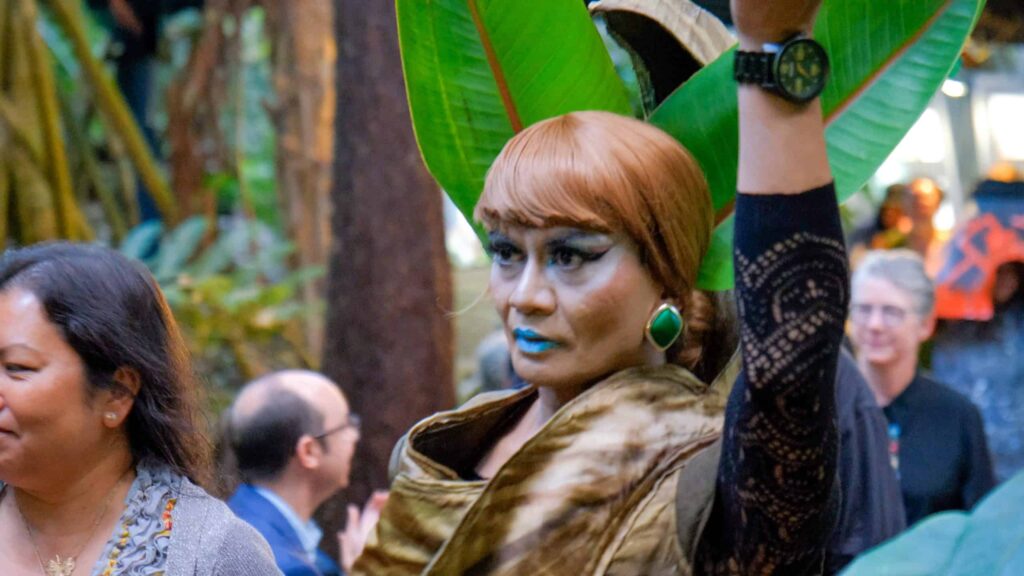
Exploring an unexpected connection between botany and queer identity, the Bloomin’ Fabulous Runway unfolded with LGBTIQ+ community members proudly showcasing French couture-style, botanic-inspired costumes at the Adelaide Botanic Gardens.
Eleven local community models confidently flaunted these innovative designs within the Bicentennial Conservatory, capturing the attention of an excited audience immersed in the breathtaking beauty of the surrounding flora.
This remarkable event was a collaborative effort between SAMESH and the Adelaide Botanic Gardens.
Lindl Lawton, the Manager of Interpretation and Cultural Collections at the Adelaide Botanic Gardens, said the event brought much joy to the community.
“You could just see during that fashion show how much sheer joy the makers got out of showcasing the works, and the models got out of modelling the works,” said Lindl.
“There was a great deal of pleasure in creating and making as a community.”
Skye Bartlett, Team Leader at SAMESH, not only designed two of the showcased works but also shared his experience of designing wedding dresses during a time when he and his now-husband were unable to marry.
“Before marriage equality, I found it very insulting to have to make wedding dresses for something that I couldn’t do myself,” he said.
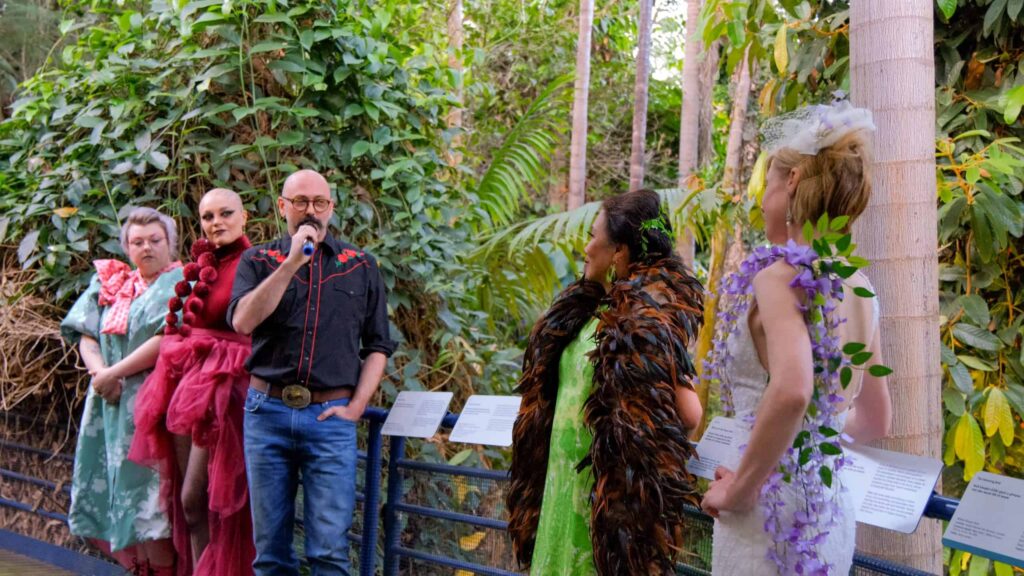
“This was quite a cathartic process, making a wedding dress as the first dress that I made since I quit designing. It made me really happy to see it on the runway as a celebration of how far we’ve come with marriage equality.”
While SAMESH predominantly focuses on health promotion and community education, Lindl saw the runway and subsequent exhibition as a unique opportunity to unite the community following the Sustainable Style workshops.
“There was just a great deal of enthusiasm amongst those workshop participants to be involved. Since we’ve had the show, I’ve heard a lot of people say, ‘I want to be involved next year,’” she said.
One design and artist statement that stood out to Lindl was from local community member Greg Kelly.
“Greg modelled his [costume after] the beautiful golden wattle, and he talks about that being a symbol of Australia,” she said.
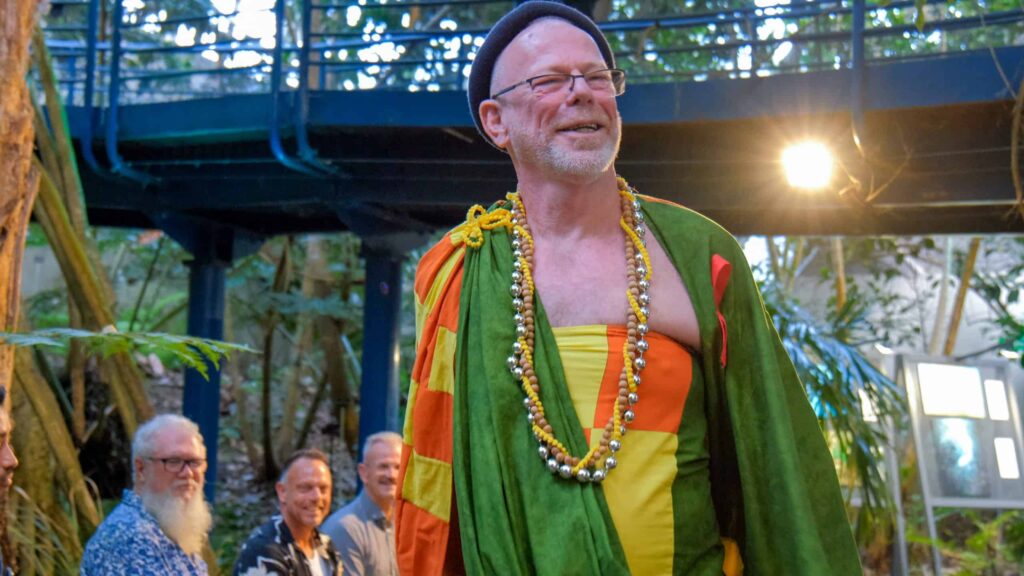
“This is his love letter to an Australian government that he feels has looked after HIV positive people. And as he says in his closing statement, ‘I am Australian, I am HIV positive, I am wattle, and we survive.’”
Nikki Sullivan, SAMESH Health Educator overseeing the Sustainable Style workshops, marvelled at the community’s creativity and is excited to see the event grow.
“Working with all of these different people, seeing the sort of creativity that is there in in people, [there were] things that they came up with that I couldn’t have even begun to imagine,” said Nikki.
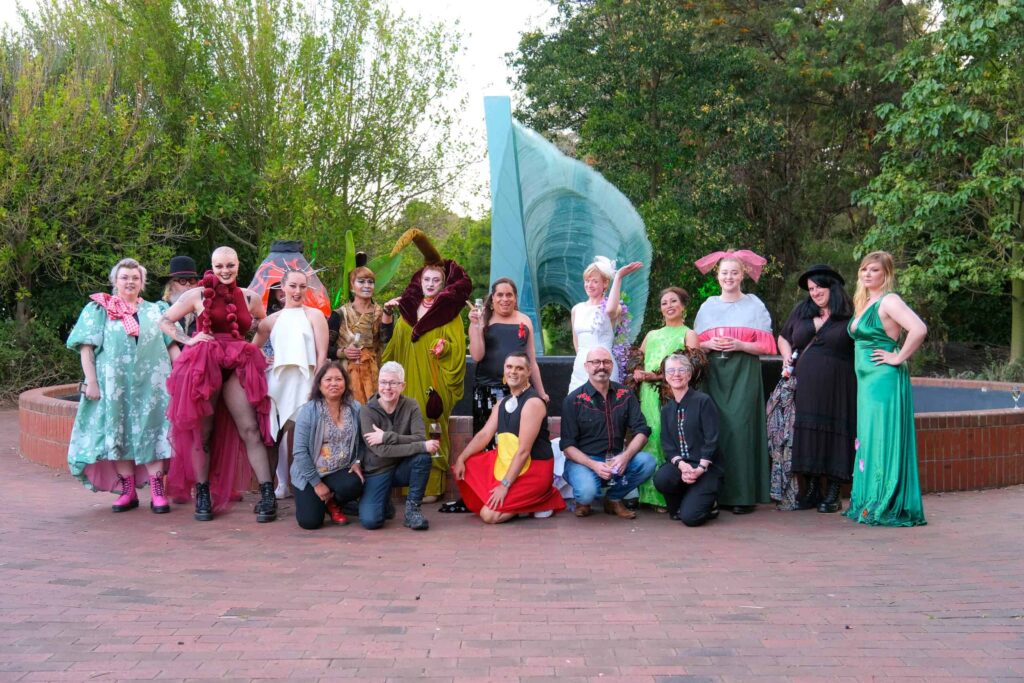
“Bring on next year for a bigger, better Bloomin’ Fabulous.”
29 March 2023
The next generation of queer spaces with My Lover Cindi
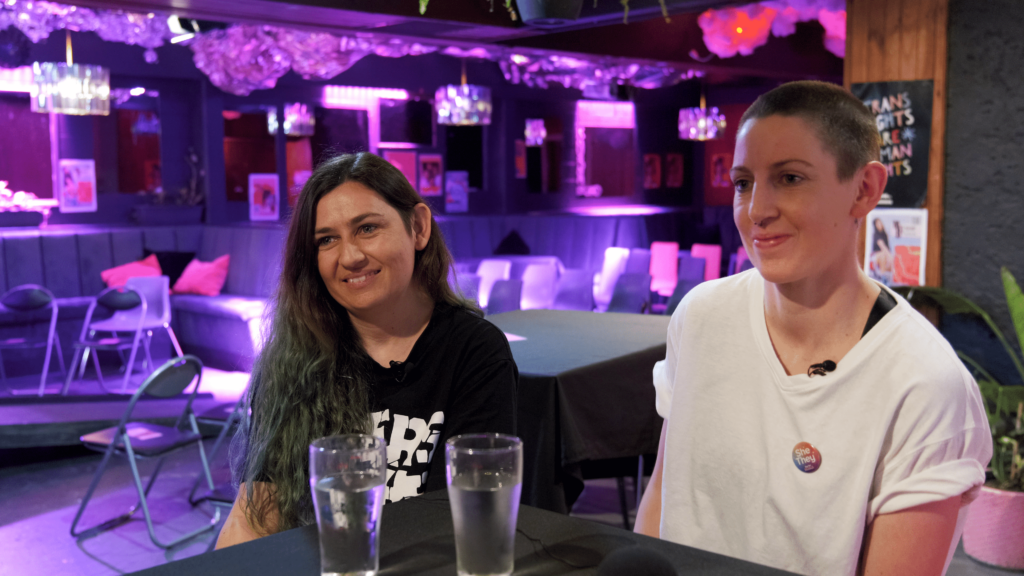
Nestled in an otherwise quiet part of Flinders St in Adelaide City, the pink neon-soaked My Lover Cindi was heavily inspired by vibrant, femme-forward venues like Henrietta Hudson in New York.
Founders Rachel Hosking and Kate Toone wanted to create a space for our diverse communities to connect more frequently than the ad-hoc or monthly LGBTIQ+ gigs held at other bars.
“I think we’ve both at times found that vibe in other venues in Adelaide, but we just wanted somewhere that was like that all the time,” said Kate.
“It could be a Wednesday night, you know?”
“Adelaide has a really long and rich history of vibrant night spaces for queer play, for queer people, and we’ve definitely participated in that. In terms of the overall kind of landscape, there was a very one-size-fits-all approach to understanding queer experience,” said Rachel.
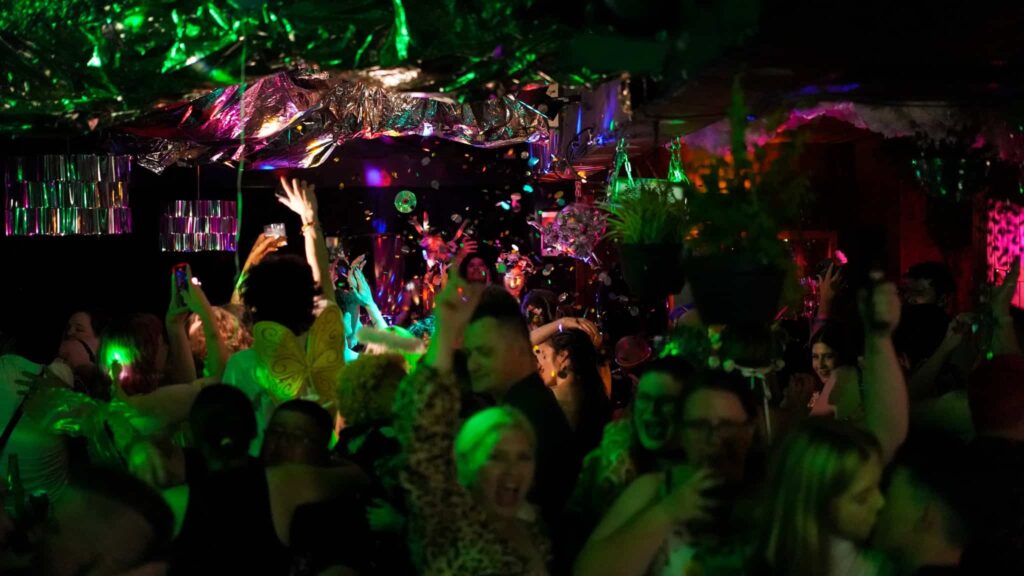
My Lover Cindi opened in 2021 during some of the more intense social distancing measures in South Australia, but it resulted in a more diverse offering of events including art classes, trivia, and cabaret.
“What could we ask people to still come out for if they weren’t able to even stand up in a venue?” said Kate.
“And so what we’re left with now, 18 months later, is a calendar that is full of different events.”
Making the venue and spread of events more accessible has been front of mind since day one for Rachel and Kate, but it hasn’t been easy.
“If you put in an accessibility measure for one population, it’s going to be inaccessible for another population just by sort of default,” said Kate.
Despite their best efforts, catering to people who are hearing impaired has been particularly difficult, as the impact on ticket cost for an Auslan interpreter would mean fewer attendees.
“We will continue providing where we can to keep building on that – whether it be providing a Fringe show once a year that’s Auslan interpreted, and making sure it’s branded really clearly,” said Rachel.
The resilience of My Lover Cindi alongside other queer-focused spaces like Diverse-City highlights a shift in Adelaide’s demographics and appetite to support different kinds of queer venues and events.
“Gone are the days of queer venues that are just DJs, dancing, and getting as drunk as you possibly can and then ending up with someone,” said Kate.
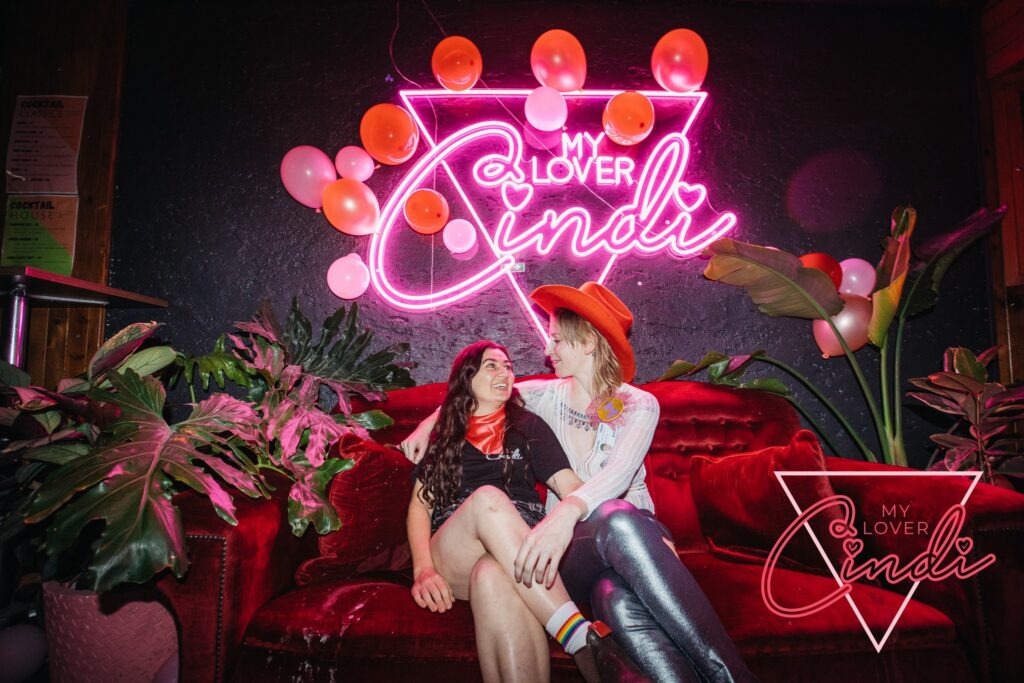
“We want all of these things that we maybe haven’t been brave enough to know that we could have before.”
22 December 2022
Making Space for a Library of Diverse-City
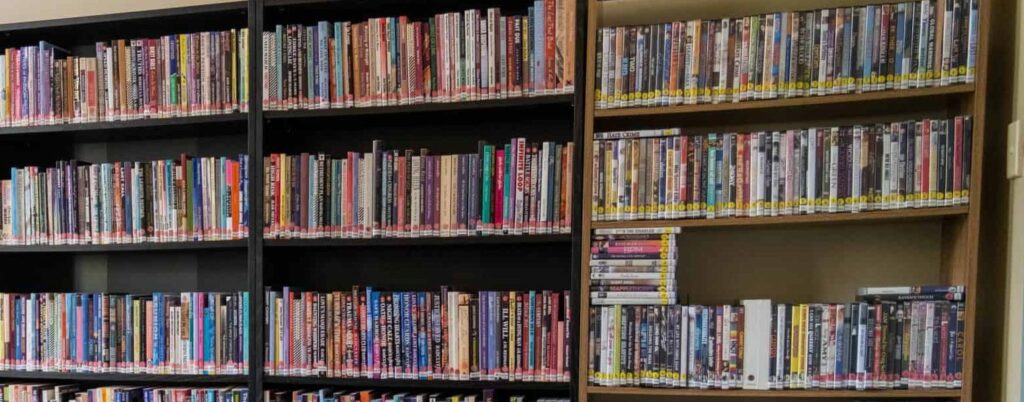
When people think about Adelaide’s queer venues, Mary’s Poppin or My Lover Cindy might be the first places that come to mind. Diverse-City founders Sue and Sarah had something different in mind when opening on Grote St in 2019.
“We wanted to broaden the age group here. Sarah and I have a vision about bringing the LGBTQ community and the mainstream communities closer together,” said Sue.
In addition to ticketed shows, free community events on offer at Diverse-City run the gamut from book clubs and LGBTIQ+ social nights to 1800s musical afternoons and a ukulele group doing interactive plays.
“There is no limit to the crazy things that I will do.”
Between events, Diverse-City is where people of all sorts can come and be themselves in a safe space.
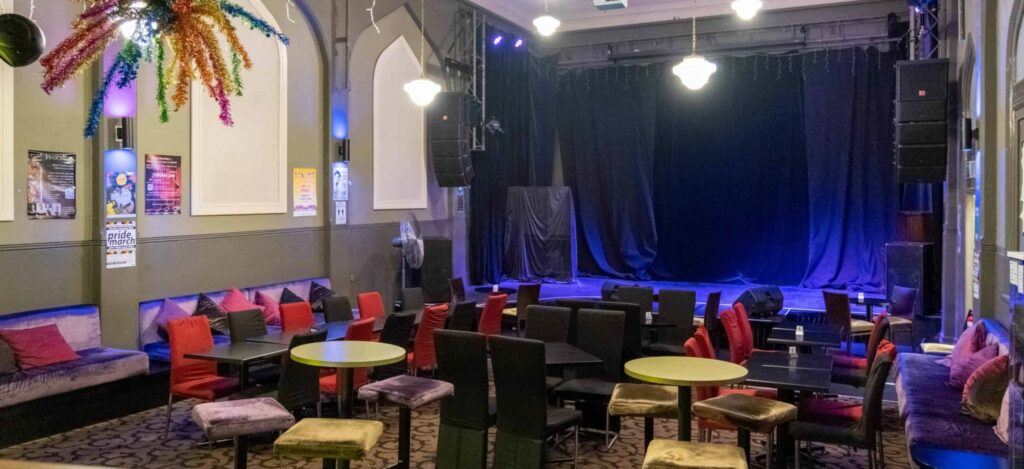
After the Darling House LGBTIQ+ Community Library in Norwood closed, part of the journey for Diverse-City included providing resources to inform and uplift communities.
“That collection had been lost over time. And there was nothing. Some of the local [queer] press had gone, and so I particularly wanted to create a place where people could go to sit and read if they wanted,” said Sue.
Community members donated materials and their time to build a library and catalogue resources upstairs at Diverse-City.
“I wanted the material to be appropriate for the community rather than read mainstream books that might have a little bit of a queer character in there. I wanted to have books that were gay, lesbian, intersex, transgender, non-binary, gender diverse. We even have kids books.” said Sue.
Retired librarian Dee used her experience in specialist and public libraries to later add extra depth to the collection and cataloguing system, but she also was keen to grow the collection from what was originally donated.
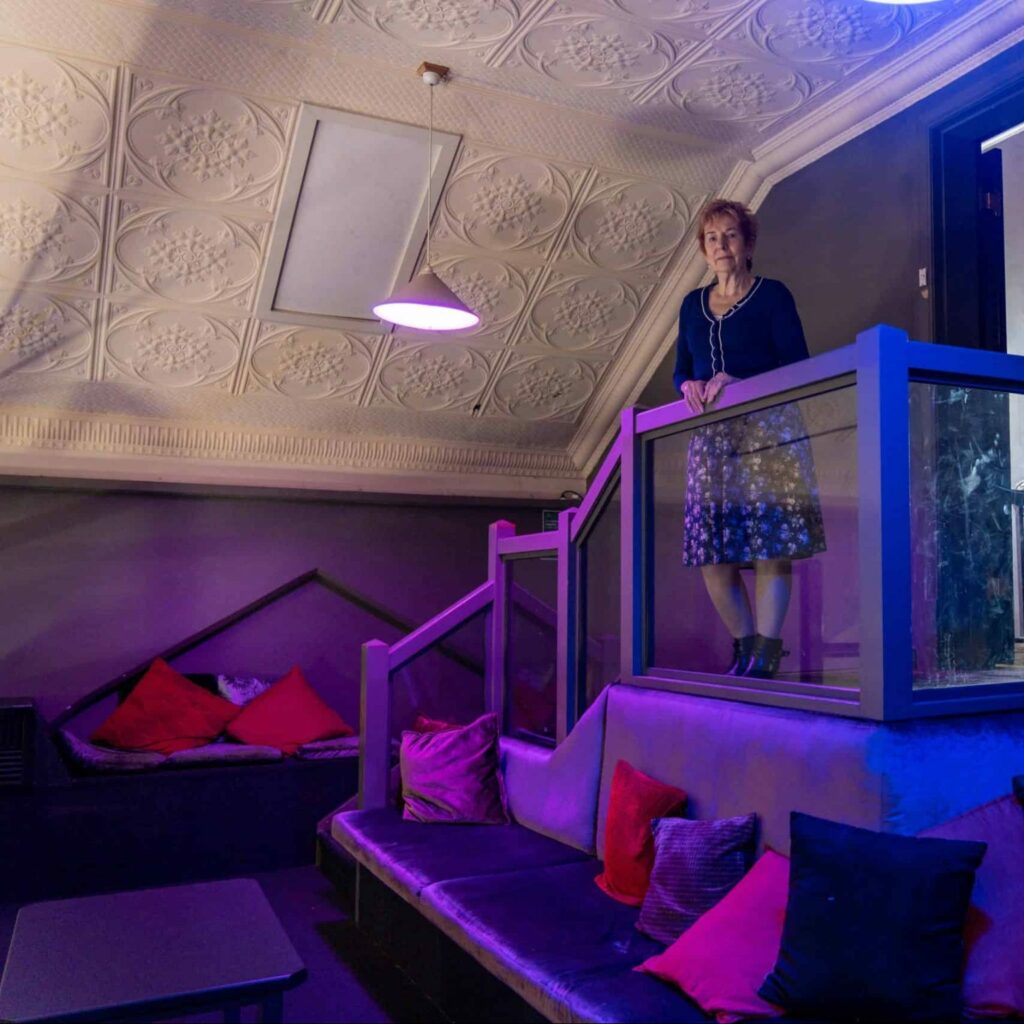
Dee loves the separate lounge upstairs where people can get comfy with a book from just down the hall.
“Transgender and non-binary [resources were] almost non-existent. So I concentrated on building out those areas and working out what’s still really relevant. The most important thing for any community is to be able to pick up a book, either by someone like them or with characters that they relate to,” said Dee.
With the limited shelf space, Dee has to make the hard decisions about which books can stay, and which can make way for more relevant resources.
“It’s looking for those things that will appeal to a range of ages and a range of interests and with particular subjects in mind and trying to balance it. An important part of what we do with the collection is listening to what people can’t find and then trying to meet that need.”
Near Diverse-City’s street level entrance is a small collection for anyone who can’t make it upstairs to the full collection.
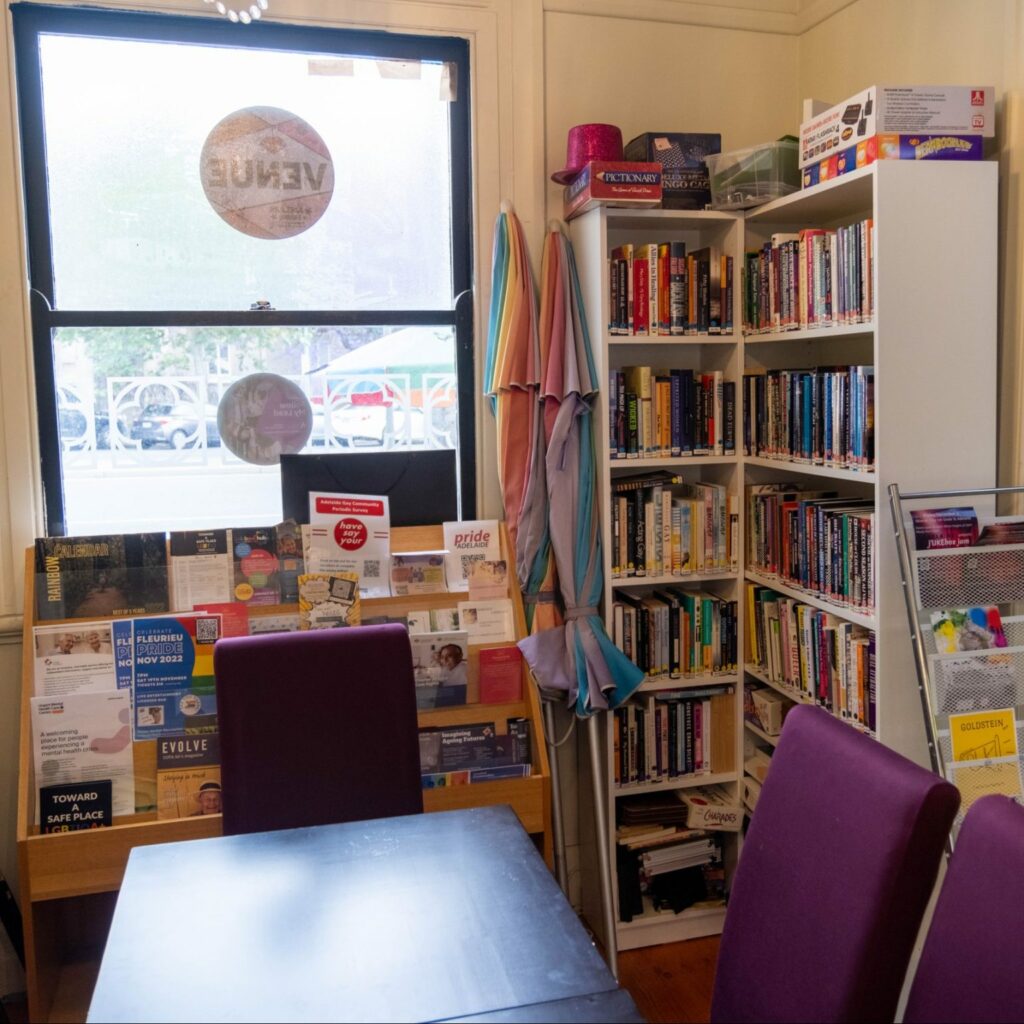
Sue said that not enough people even know the library exists since it’s out of the way, upstairs away from the entertainment and social space.
“It gives people more than just a book to read. It gives people social connection. And that’s part of why we wanted the library to be in place. We wanted people to have access to materials, but we wanted people to have access to community. And that’s what the library actually does.”
28 July 2022
The queer First Nations group connecting across state borders
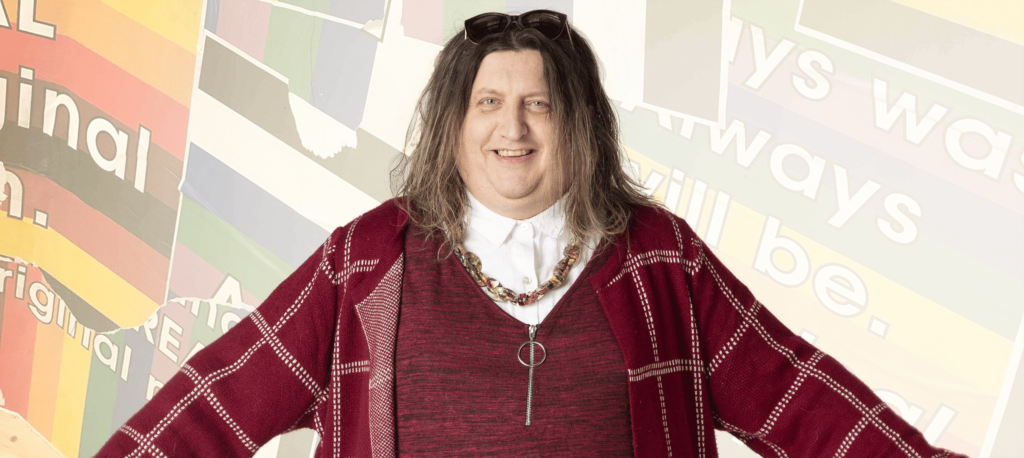
After the last few years of social distancing and disconnection, Ricki Spencer was keen to create a space for queer First Nations people to come together safely.
“A lot of it came from my own want to connect to country, and want to connect with other people who are queer and blak throughout Australia,” she said.
Ricki is a trans and disability community advocate, and co-facilitator of Thorne Harbour Health’s new Yarning Blak & Queer online group. She worked with First Nations Health Lead Peter Waples-Crowe on the project.
“It’s been about a year and a half in the making because we wanted to wait for the right opportunity. For some people, it’s not safe to come out,” said Ricki.
“Even in blak, queer spaces in some remote communities — being a sistergirl or brotherboy, it’s not easy. And being Trans comes with its own issues.”
The group is held on the last Thursday of the month from 6-7 pm AEST. Each session is an opportunity for participants to explore what’s happening in their lives with other First Nations people.
“People might want to talk about if there was an event occurring in their state. It might be reading about different totems or artwork or songlines.”
Ricki wanted to bring people together across the country, with attendees calling in from Tasmania, NSW, Victoria and the Northern Territory so far.
There’s also a private Facebook group for people to share information outside the sessions.
For many who haven’t been able to, it’s a unique opportunity to explore what cultural connection means to them.
“It allows us to talk freely about our own experiences of racism that we may have experienced. There’s a sense of understanding of what it’s like to feel excluded in some spaces, but it’s also a chance to celebrate our uniqueness,” said Ricki.
“We all come from different experiences and backgrounds, but we all have that deep spiritual connection to country and want to belong.”
The hope is that Yarning Blak & Queer will evolve and provide more opportunities to connect with the community.
“We’re hoping eventually there’ll be more facilitators and all sorts of things could come out of it — producing artwork, producing all of the wonderful things that I can’t pre-empt. It depends on whatever the group wants to create and develop.”
6 July 2022
How self-testing has CONNECTed with the community
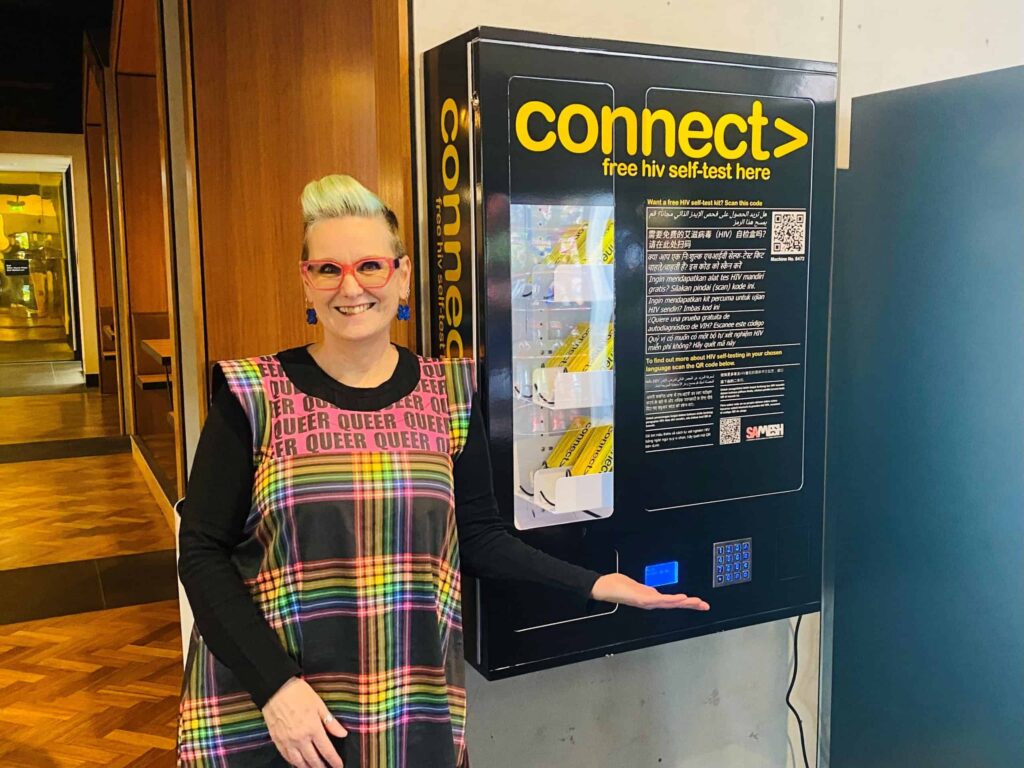
CONNECT is the first federally-funded project of its kind in Australia — dispensing HIV self-test kits to support rapid HIV testing and to strengthen pathways to treatment and support.
Since launching in March 2022 with five vending machines on university campuses and sex-on-premises venues, we’ve seen over 500 registered users and more than 550 kits dispensed.
While the target groups for the CONNECT project are men who have sex with men (in particular from non-English speaking backgrounds), usage data as of July this year shows that 45% of users are overseas born. Additionally, 46% of users identify as heterosexual.
CONNECT Project Coordinator Nikki Sullivan has been surprised most by the enthusiasm from young people engaging with the project.
“I had assumed that for many young people, HIV was something they thought happened a long time ago, was no longer an issue, and had no relevance to them or their lives. My view of that has really changed,” she said.
“University students are keen to take control of their sexual health and that they see testing as one of the ways to do that.”
Nikki has also been taken aback to hear at community venues and via survey responses how many people aren’t practicing safe sex.
“There’s a proportion of people who in the follow up survey have told us they have condomless sex, and a number are not on PrEP. In fact, I’m really surprised by the number of people I’ve spoken to when out doing SAMESH outreach who don’t know anything about PrEP or PEP.”
While the project’s target groups included culturally and linguistically diverse (CALD) people, Nikki hopes to see the pilot lead to future initiatives that target other vulnerable communities.
“CONNECT doesn’t engage some at risk communities such as homeless people, prisoners, First Nations people, and those in regional and remote areas,” she said.
“I would like to see the further development of rapid testing initiatives that tries to address this.”